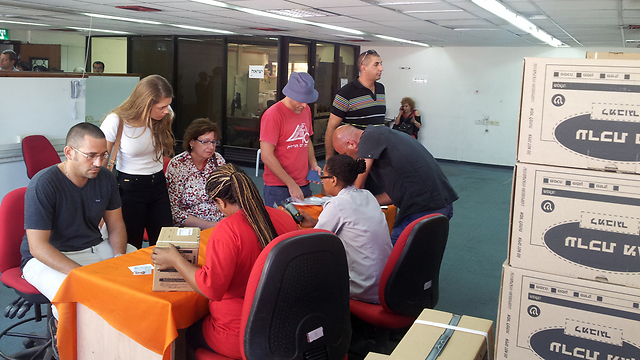Reports of a possible US strike in Syria
have led to a massive rush of Israelis for gas masks, but what about the foreign workers population? An Eritrean
asylum seeker from Jerusalem was refused a gas mask Wednesday because he is not an Israeli citizen. "I have no saferoom in my house or a gas mask and I am afraid," he said. "I think the country needs to take care of us, even if it costs us money."
The 30-year-old man said he is afraid to experience another war, as he did in Eritrea. "We're so worried of a possibility of war here," he said. "I hope war doesn't come after me."
Related stories:
- Sa'ar: Thousands of migrants will be deported after holidays
- 177 asylum seekers left Israel in July
- Asylum seekers: We beg the Israeli government – protect us
Reports of a possible American attack in Syria have caused a sharp rise in the number of Israelis seeking gas masks. The Home Front Command has not published any new guidelines, but gas mask distribution centers have been flooded, and dozens of extra workers were sent in.
From data the Home Front Command and State Comptroller holds, about 40% of the population is not equipped with a gas mask. These reports highlight the gaps between reality and promises made in government decisions.
In response to the Comptroller's report, the Internal Security Ministry has said that despite the gaps in supply, a significant amount of working gas masks does exist, and those can be distributed in the short term. Still, it remains unclear how the State will complete protection of all its citizens and what will be done with the 220,000 foreign workers—55,000 of which are asylum seekers—tourists, and other foreigners in case of an attack on the country.
Beit Aryeh Regional Council head Avi Naim, who also serves as chairman of the security committee at the Union of Local Authorities in Israel, says the foreign population is very susceptible to injury in case of an emergency. "The foreign population is mainly in big cities, in houses without a safe space, and their exposure to injury is huge," Naim said. "But Israel isn't even taking care of its own citizens right now. So it's important that first thing's first."
Reut Michaeli, director of the Hotline for Migrant Workers, has criticized the State, saying authorities are not educating or equipping the foreign workers population appropriately.
"It's unclear what foreign workers who care for the elderly will do in a state of emergency," said Michaeli, "The authorities need to remember that these are people who live amongst us and it is our duty to protect them if an emergency occurs."
The IDF Spokesperson's Unit said in reply: "The Home Front Command is prepared at any time to protect the citizens of Israel in an emergency to the best of its ability. The gas masks distribution plan is meant for citizens of Israel and if an emergency occurs an assessment will be made about those staying in Israel without citizenship. The Home Front Command will in this case offer instructions and aid in a variety of languages."
- Receive Ynetnews updates
directly to your desktop
















